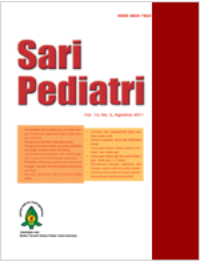Pengaruh Pola Asuh terhadap Perilaku Makan Anak Usia 4-6 Tahun
Sari
Latar belakang. Perilaku makan yang terbentuk saat dewasa diawali oleh perilaku makan di usia anak-anak. Faktor lingkungan terdekat yang berpengaruh pada perilaku makan adalah keluarga diantaranya pola asuh orangtua. Beberapa penelitian menyebutkan terdapat hubungan pola makan remaja dengan pola asuh orangtua.
Tujuan. Menganalisis hubungan pola asuh terhadap perilaku makan anak usia 4-6 tahun.
Metode. Penelitian dengan desain cross-sectional, dilaksanakan di beberapa TK di Semarang dengan subyek orangtua dan anak usia 4-6 tahun yang memenuhi kriteria inklusi dan eksklusi. Pemilihan subyek dilakukan dengan teknik consecutive sampling dengan besar sampel sebanyak 153 subyek. Data perilaku makan diperoleh melalui Children Eating Behaviour Questionnaire (CEBQ), sedangkan data pola asuh melalui kuesioner pola asuh. Analisis data menggunakan uji koefisien kontingensi.
Hasil. Sebanyak 125 (82,4%) anak mendapatkan pola asuh demokratis, 18 (11,1%) pola asuh otoriter dan 10 (6,5%) permisif, 72,5% di antaranya adalah penyuka makanan dan 27,5% penghindar makanan. Terdapat korelasi sangat lemah pola asuh demokratis terhadap terhadap perilaku makan (r=0,197;p=0,013). Terdapat korelasi sangat lemah pola asuh permisif terhadap terhadap perilaku makan (r=0,189;p=0,017).Tidak didapatkan korelasi yang bermakna antara pola asuh otoriter terhadap perilaku makan.
Kesimpulan. Penelitian ini memberikan informasi dengan menunjukkan adanya pengaruh pola asuh demokratis dan permisif terhadap perilaku anak, tetapi tidak ada korelasi pada pola asuh otoriter.
Kata Kunci
Teks Lengkap:
PDFReferensi
Kremers SPJ, Brug J, Vries H, Engels RCME. Parenting style and adolescent fruit consumption. Appetite 2003;41:43-50.
Scaglioni S, Salvioni M, Galimberti C. Influence of parental attitudes in the development of children eating behavior. Brit J Nutr 2008;99:S22-5.
Soetjiningsih. Faktor-faktor yang Mempengaruhi Tumbuh Kembang. Dalam: Soetjiningsih, Ranuh IG, penyunting. Tumbuh Kembang Anak. Ed 2. Jakarta: EGC; 2013.h.61-72.
Piazza CC. Feeding disorders and behavior: what have we learned? Dev Disabil Res Rev 2008;14:174-81.
Maccoby ED, Martin JA. Socialization in the context of the family: parent-child interaction. In Socialization, personality and social development. Dalam: Mussen PH, Hetherington EM, penyunting. Manual of child psychology. vol 4. New York: John Wiley and Sons; 1983.h.1-101
Baumrind D. Child care practices anteceding three patterns of preschool behavior. Genetic Psychology Monographs. 1967;75: 43-88.
Northstone K, Emmett PM. Are dietary patterns stable throughout early and mid-childhood? A birth cohort study. Br J Nutr 2008;100:1069-76.
Arlinghaus KR, Vollrath K, Hernandez DC. Authoritative parent feeding style is associated with better child dietary quality at dinner among low-income minority families. Am J Clin Nutr 2018;108:730-6.
Dewi SK, Soetjiningsih. Kesulitan makan pada anak. Dalam: Soetjiningsih, Ranuh IG, penyunting. Tumbuh Kembang Anak. Edisi kedua. IDAI: Sagung Seto; 2013.h.325-36.
Schroeder CS, Gordon BN. Assesment and treatment of chidhood problems. Edisi ke-2. London: The Guilford Press; 2002. h.81-114.
Finnane, JM., Jansen E, Mallan KM, Daniels LA. Mealtime structure and responsive feeding practices are associated with less food fussiness and more food enjoyment in children. J. Nutr. Educ. Behav 2017;49:11-18.
Spettigue W, Norris ML, Santos A, Obeid N. Treatment of children and adolescents with avoidant/restrictive food intake disorder: a case series examining the feasibility of family therapy and adjuctive treatments. J Eating Disorders 2018;6:1-11.
Kementerian Kesehatan RI. Penyajian Pokok-Pokok Hasil Riset Kesehatan Dasar. Jakarta: Badan Penelitian dan Pengembangan Kesehatan Kementerian Kesehatan RI; 2018.
Baumrind D. Rearing competent children. Dalam: Damon W, penyunting. Child development today and tomorrow. San Francisco (CA): Jossey Bass; 1989.h.349-78.
Darling N, Steinberg L: Parenting style as context: An integrative model. Psychological Bulletin 1993;113:487-96.
Rhee K. Childhood overweight and the relationship between parent behaviors, parenting style and family functioning. AAPSS 2008;615:11-37.
Ruqayah F. Pola asuhan anak dalam penanaman nilai-nilai pada masyarakat kampung Naga. J local culture 2015;2:63-80.
Putra MR. Pengasuhan anak usia 5-6 tahun di Kampung Tapak Lebar Sumatera Selatan. Jurnal Pendidikan Usia Dini 2016;10:29-44.
Arredondo EM, Elder JP, Ayala GX, Campell N, Baquero B, Duerksen S. Is parenting style related to children’s eating and physical activity in latino families? Health Edu Res 2006;21:862-871.
Brann LS, Skinner JD. More controlling child-feeding practices are found among parents of boys with an average body mass index compared with parents of boys with a high body mass index. J the American Dietetic Association 2005;105:1411-16.
Montgomery C, Jackson DM, Kelly LA, Reilly JJ. Parental feeding style, energy intake and weight status in young Scottish children. Brit J Nutr 2006;96:1149-53.
Wardle J, Guthrie CA, Sanderson S, Rapoport L. Development of the children’s eating behavior questionnaire. J. Child Psychol Psychiat 2001;42:963-70.
Podlesak AKM, Mozer ME, Smith-Simpson S, Lee SY, Donovan SM. Associations between parenting style and parent and toddler mealtime behaviors. Curr Dev Nutr 2017;1:1-7
Birch LL. Development of food preferences. Annu Rev Nutr 1999;19:41–62.
Mandara J. The typological approach in child and family psychology: a review of theory, methods, and research. Clin Child Fam Psychol Rev 2003;6:129-46.
Pearson N, Atkin AJ, Biddle SJ, Gorely T, Edwardson C. Parenting styles, family structure and adolescent dietary behaviour. Public Health Nutr 2010;13: 1245-53.
Rhee KE, Lumeng JC, Appugliese DP, Kaciroti N, Bradley RH. Parenting styles and overweight status in first grade. Pediatrics 2006;117: 2047-54.
Hubbs-Tait L, Kennedy TS, Page MC, Topham GL, Harrist AW. Parental feeding practices predict authoritative, authoritarian, and permissive parenting styles. J Am Diet Assoc 2008;108:1154-61.
Hennessy E, Hughes SO, Goldberg JP, Hyatt RR, Economos CD. Permissive parental feeding behavior is associated with an increase in intake of low-nutrient-dense foods among American children living in rural communities. J Acad Nutr Diet 2012;112:142-8.
Arlinghaus KR, Vollrath K, Hernandez DC. Authoritative parent feeding style is associated with better child dietary quality at dinner among low-income minority families. Am J Clin Nutr 2018;108:730-36.
DOI: http://dx.doi.org/10.14238/sp23.3.2021.150-7
Refbacks
- Saat ini tidak ada refbacks.
##submission.copyrightStatement##
##submission.license.cc.by-nc-sa4.footer##
Email: editorial [at] saripediatri.org


Sari Pediatri diterbitkan oleh Badan Penerbit Ikatan Dokter Anak Indonesia
Ciptaan disebarluaskan di bawah Lisensi Creative Commons Atribusi-NonKomersial-BerbagiSerupa 4.0 Internasional.




